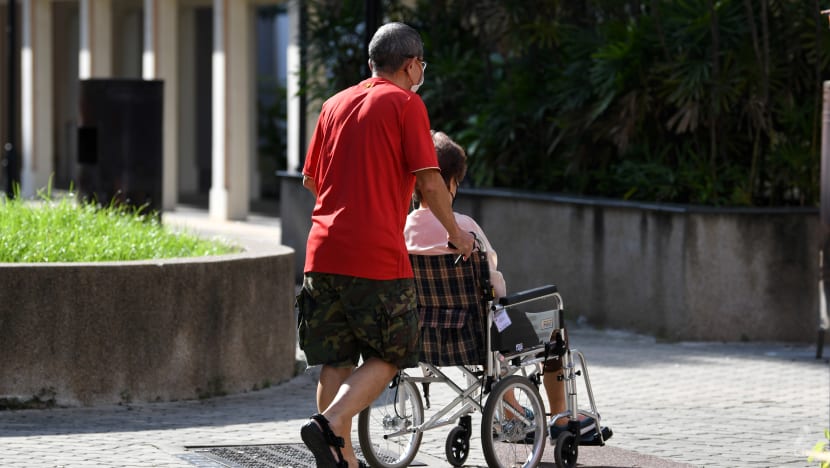‘Not as simple as putting them away’: In elder abuse cases, social workers help abusers too
Elder abuse is on the rise. But helping victims is not always about punishing the perpetrators, as CNA Insider finds out from two social workers on the podcast Heavy Duty.

SINGAPORE: Daughter-in-law stops her children from interacting with their “dirty” grandmother. Grandma is also not allowed to cook at home.
Then one day, daughter-in-law hits Grandma’s head with an object, and the older woman picks up an item in self-defence. She reports her daughter-in-law to the police and applies for a personal protection order (PPO).
Grandma has another child who wants her to move in, but she refuses to leave her oldest son’s home. She believes it is only right to live with her “male descendant”.
This was the situation that social worker Valencia Ng faced when trying to help the elderly woman about five years ago.
It made Ng realise that while it is important for the elderly to be physically safe, there are other factors to consider. Family relationships, however imperfect, may be equally important to them.
Removing or distancing them from those relationships could cause psychological harm, Ng told CNA Insider on the podcast Heavy Duty. “We have to consider all kinds of safety.”
Listen to the social guardians who look out for the old and vulnerable:
Navigating tricky family ties while respecting the elderly’s decisions are all in a day’s work for the senior social worker and team lead at Care Corner Project StART, a family violence specialist centre.
Ng, 30, studied chemistry at university, but it was her time volunteering to befriend seniors that settled her career path.

At Project StART, elder abuse makes up 10 to 20 per cent of the caseload. The centre saw 42 such cases last year and 32 cases in 2020.
The increase is also seen at the national level. From 232 abuse cases involving vulnerable adults aged 65 or over in 2019, the figure rose to 338 cases last year, Minister of State (Social and Family Development) Sun Xueling told Parliament in April.
Yet, social workers say the problem remains underreported because some elderly persons hesitate to step forward. They may be ashamed or fear getting their family members into trouble.
“Sometimes they choose to keep quiet because they’re worried they may not be able to substantiate their accounts,” said Ng. They also worry about ending up with no one to take care of them, and may downplay the violence they have experienced.
Project StART gets its elder abuse cases through hospitals — when doctors suspect abuse — the police, family members, bystanders and, less often, through the elderly themselves.
In cases referred by the police, Project StART’s role is usually to help the victim work out a safety plan and/or apply for a PPO.
Often, Ng and her colleagues must assure elderly victims. “When they come in, there can be quite a lot of ambivalence about how much they should share with the professionals,” she said.
So social workers stress that their intent is not to do further harm to the victim’s relationships but to help everyone in the family.
Many of the elderly also have the misconception that PPOs will mean criminal records for their abusers, who tend to be family members.
The social workers assure them that is not the case. Instead, the PPO serves as a deterrence and signal that the elderly persons are standing up for themselves, Ng tells them.

SEEING ABUSERS AS HAVING POTENTIAL TO CHANGE
What is less known about Ng’s work is that she regularly engages with perpetrators. In fact, 30 per cent of her clients are the perpetrators.
Despite sometimes feeling the injustice of what they have done to the victims, she views the perpetrators as, first and foremost, humans with the potential to change.
In the case of the abused grandmother, for instance, Ng’s team did not only visit the elderly woman to check on her and send the daughter-in-law the message that “there’s an agency who’s watching, who’s concerned about the family”.
They also engaged with the daughter-in-law and told her the children could see how she was treating her mother-in-law. “When they see you abuse Grandmother, they’re learning from you,” Ng recalled telling her.
She realised that there were people watching. And that can motivate change.”
The grandmother’s daughter, who lived elsewhere, also dropped by more often to see her mother.
Perpetrators of abuse may also be the carers, so any positive change in them would benefit the victims, Ng noted.
“Working with perpetrators of elder abuse isn’t as simple as putting them away … giving them the punishment due (them),” she said. “How can we focus on meeting the family’s needs? Who are the people in the family who require care?”
She remembers once receiving a report of suspected physical abuse. It involved a woman who bruised easily and whose dementia had progressed. When Ng visited the woman’s home, she was alone and lying on the floor in her room.
It turned out that her son had mild intellectual disability. She used to care for him, but he was now her carer.
He knew little about the care that people with advanced dementia need, such as help with going to the toilet. He thought he had to only ensure his mother took her medication for various health conditions.
In cases like this, social workers will try to help the family and could involve other social service organisations.
Such circumstances are precisely why St Luke’s Hospital’s principal medical social worker, Jonathan Chong, finds it hard to label anyone a perpetrator.

Nearly all patients in St Luke’s, a community hospital, come from acute hospitals and are there for rehabilitative care. Among them, Chong, 54, has seen his share of cases that result from neglect.
“Family members neglected the patient possibly due to their own stresses, and more so if they need to make a living,” he said.
There are also carers who cannot manage after their relatives’ health conditions get worse. Chong remembers one case years ago when he was seconded to a home care provider.
A home care nurse visited a patient who had a stroke and needed diapers and tube feeding. The nurse found that the patient, in her 70s, was “smelly”. A pressure sore had turned into a wound.
Two days later when the home care team checked on her again, the wound had worsened, putting her in a “precarious” state. But her son refused to send her to the emergency department.
In the end, Chong and his colleagues reported the case to the authorities and got the patient warded. “We do empathise with him; it’s just that (the) neglect was a grave concern to us,” he said.
Chong reckoned the son was “fairly traumatised” by his mother’s stroke and was also suffering. “He didn’t talk to anybody; he was by himself,” said Chong.
I wouldn’t say that he was a perpetrator. It was just circumstance.”
Like Ng, he sees the restoration of relationships as a big part of his work. He gets great satisfaction when — a month or two after his family conferences for patients — some seniors report that their children visit more often.
Describing the feeling, he said: “Wow, you did something good for this family.”
To reduce the risk of elder abuse, Ng issued a call to “break the secrecy”, given that it often happens within the household.
The elderly would rather not air their dirty linen in public, which could encourage perpetrators to continue the abuse. Thus, it is important for other family members, neighbours and even strangers to show care and concern for seniors, Ng said.
Simple things like saying hello can go a long way towards showing seniors that someone cares for them, and this could encourage them to reach out if they need help, she said.
People must also not have the mindset that the elderly are a burden and unable to contribute any more, she added. “Those kinds of mindsets are very fertile ground for abuse to take place,” she stressed.
“So I feel it’s important for us to create platforms where seniors can contribute and … find meaning in what they’re doing.”
To find out how Valencia Ng and Jonathan Chong got resourceful to help abused seniors, tune in to Heavy Duty by CNA Insider.













